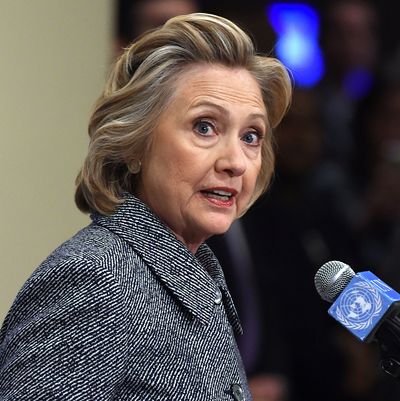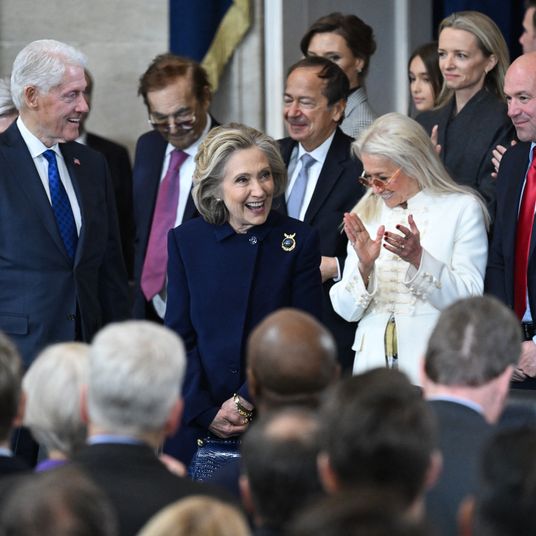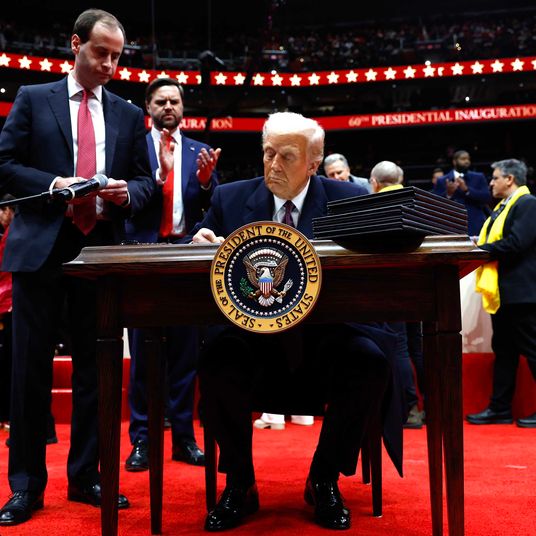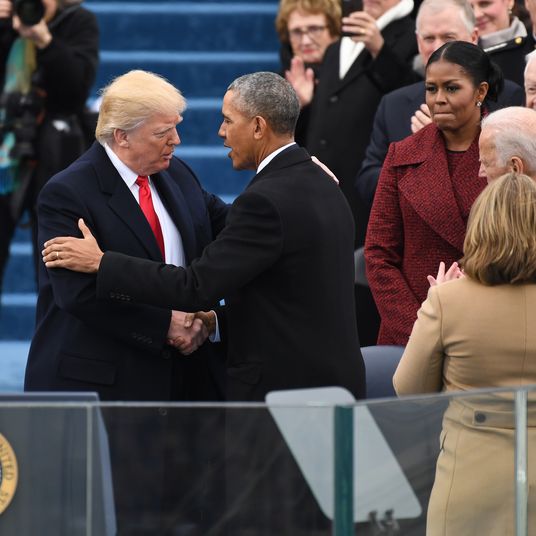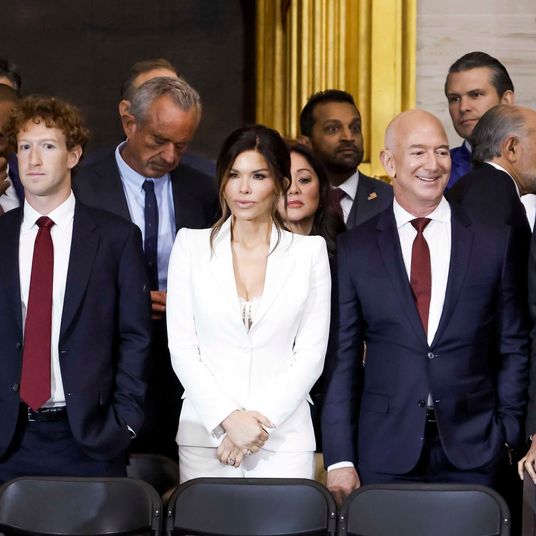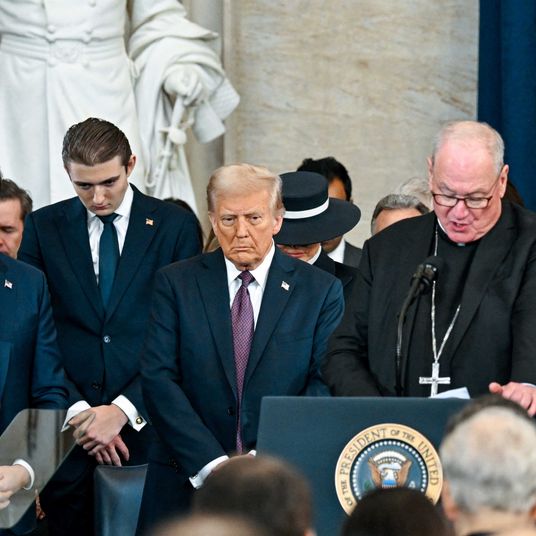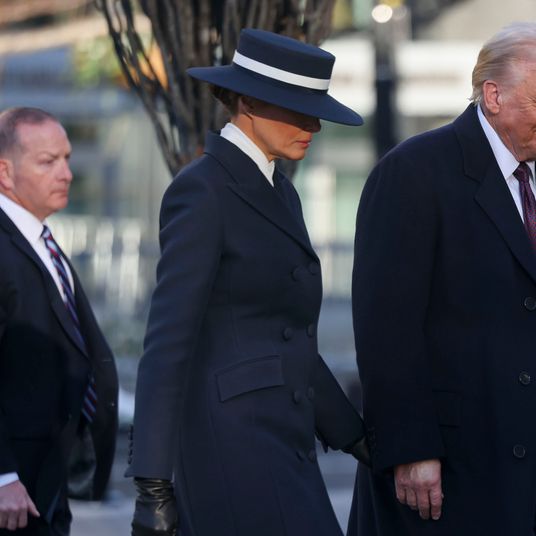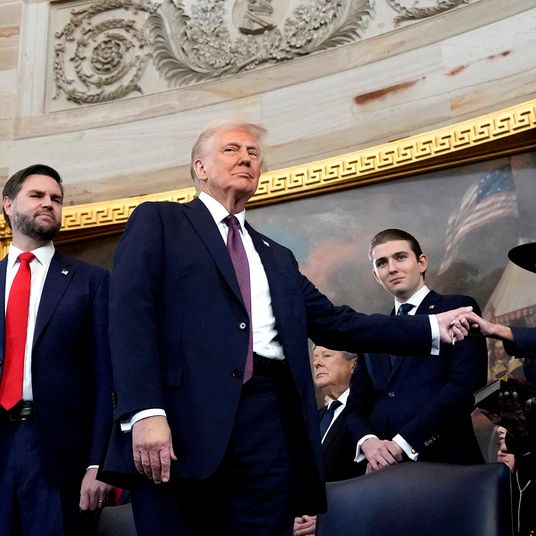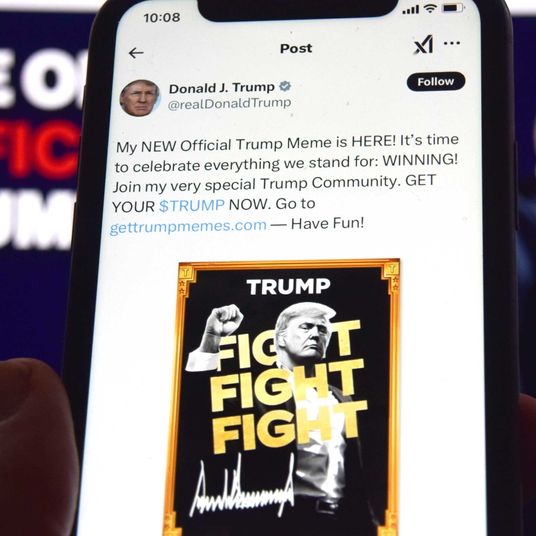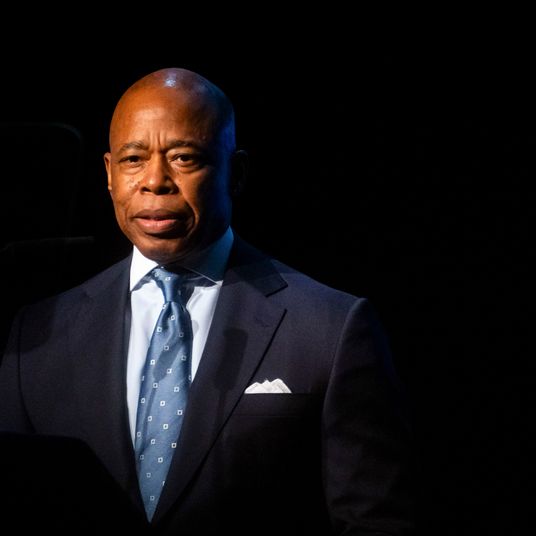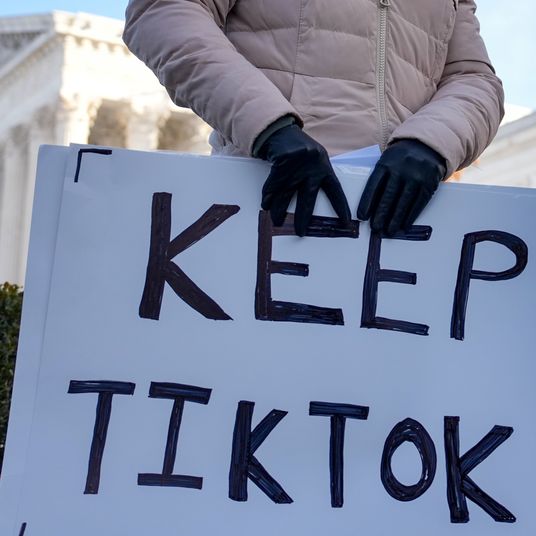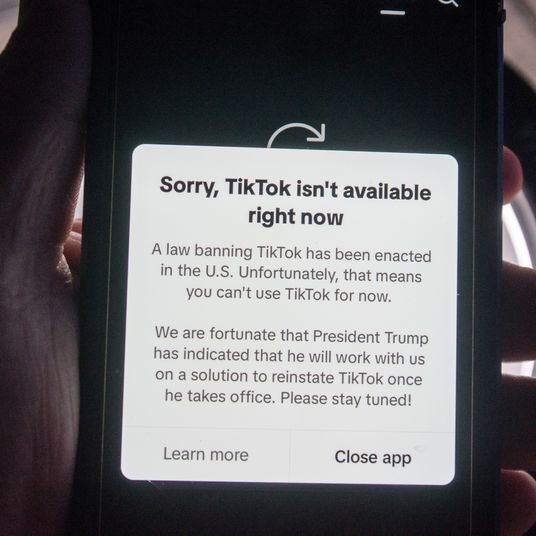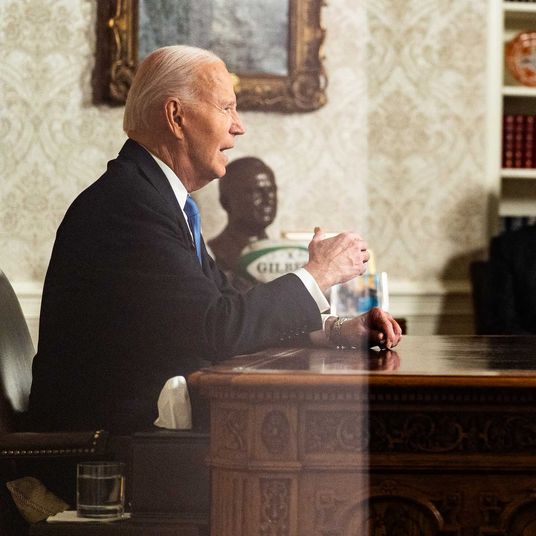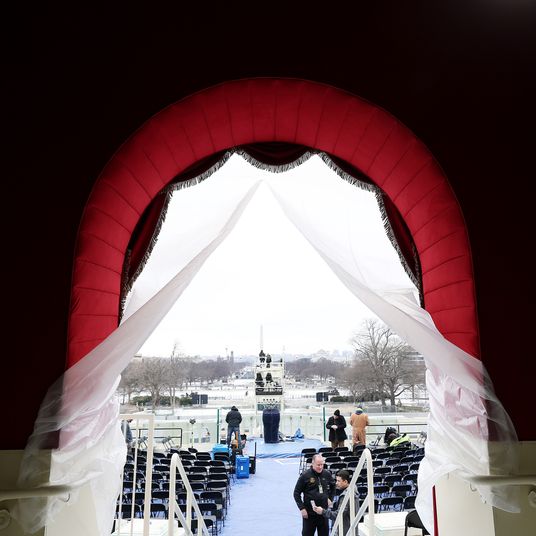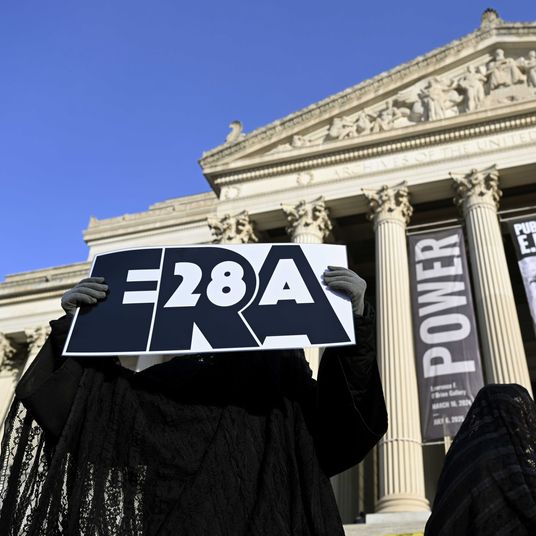Clinton sort of responding to Emailgate at her press conference Tuesday.
Photo: Don Emmert/AFP/Getty Images
Most weeks, New York Magazine writer-at-large Frank Rich speaks with contributor Alex Carp about the biggest stories in politics and culture. This week, the magazine asked him about Hillary Clinton and the ongoing email saga, the GOP’s open letter to Iran, and the future of NBC News.
Hillary Clinton finally defended her use of private email with a 20-minute news conference, which did little for those on the right set on fanning the flames of controversy to Benghazi-type levels. What’s the playbook for her now?
That it took Clinton as long as it did to respond to the rising chorus of these questions, and that she did so as defensively and unconvincingly as she did, is yet more evidence that she’s not ready for the brutality of a presidential campaign. This hastily called, abruptly truncated press conference was reminiscent of the mistakes she made last year in her ill-fated book tour. She didn’t schedule yesterday’s appearance until after the most senior of Democratic senators, Dianne Feinstein, essentially demanded that she speak up.
Some of what Clinton said didn’t pass the smell test. It reminded me of an episode in the first season of Veep where the vice-president announces she will release all her internal office correspondence to quell a controversy and then instructs her staff to make sure it’s “Modified Full Disclosure Lite.” That’s what we got here. Why, for instance, would Clinton say that she “didn’t see any reason to keep” her personal emails? Those are precisely the emails that every American keeps.
If she doesn’t become more forthright and less defensive when she’s under fire, this is going to be a very long campaign for her. Though we keep being told that she and those around her are determined not to repeat the mistakes of 2008, so far there’s no evidence of that. And the much tougher questions — starting with those about the donors to the Bill, Hillary and Chelsea Clinton Foundation — are yet to come.
But the right’s response to the press conference shows that her antagonists haven’t learned anything either since the first Clinton era. Does anyone seriously believe that there was some Benghazi smoking gun in Clinton’s emails, deleted or not, on that Chappaqua server? The theory that the bloodbath at Benghazi was some kind of conspiracy rather than a tragedy of errors makes sense only if you subscribe to the Darrell Issa school of jurisprudence. And already Clinton’s foes are overreaching just as they did in the frenzy that led to her husband’s impeachment. The Wall Street Journal editorial this morning, for instance, brought up those golden oldies from Clinton conspiracy theorists of the 1990’s — Clinton’s profits in cattle futures and phantom billing records from her old Rose Law Firm in Arkansas. If the right goes full Whitewater again — let’s remember that the Journal published no fewer than five books back then collecting its editorials on the Clinton scandals — a backlash is soon to follow. And Hillary Clinton can laugh all the way to the White House.
The open letter from 47 Republican senators to Iran opposing the ongoing nuclear negotiations has so far earned scorn not just from the president and vice-president, but also from the seven Senate Republicans who chose not to sign and the Iranian foreign minister, who called it “mostly a propaganda ploy” and chastised the senators for not understanding the Constitution. Following the Benjamin Netanyahu invitation, this is the second GOP attempt to intervene and scuttle the talks. Will these actions have any bearing on the chance for a deal?
This is not the first time since the Republicans took full control of Congress in January that they have played Russian Roulette with national security for partisan purposes — another being their monthlong threat to delay funding the Department of Homeland Security. No one knows whether any of these efforts will scuttle the Iran negotiations (we’ll learn that at the deadline, March 24) or, for that matter, influence the Israeli elections (March 17). What we do know for certain is that the GOP congressional majority that promised it would show it knows how “to govern” is proving the exact reverse. Its mission is only to oppose President Obama. And this is just the beginning. More threats to shut down the government will loom at every budget impasse. As the veteran foreign policy hand Leslie Gelb put it this week, the Republicans have now reached the point where they “hate President Obama more than they love America.”
The letter written by the 47 Senators should be read by every American — for laughs. It is addressed to “the leaders of the Islamic Republican of Iran” — a term so nebulous given how Iran is governed that the letter might as well have been mailed to “the city of Tehran, Iran” and addressed to “Occupant.” What follows is a condescending how-a-treaty-becomes-a-law civic lesson to the Iranians that seems based on the supposition that they are idiots who barely know more than phrasebook English. That Tom Cotton, the freshman senator from Arkansas who drafted the letter, thinks that the Iranians are stupid disqualifies him from having any say in our national security. No American leader should ever underestimate the country’s adversaries, particularly if they are as wily as the Iranians, and particularly if, in Cotton’s case, you are essentially ginning up a war. (Within 24 hours of his letter’s release, Cotton had an off-the-record meeting with a major lobbying group for defense contractors like Northrop Grumman and Boeing.)
And, as it turns out, Cotton and his cohort have little understanding of the Constitutional points on which they were schooling the Iranians. This was noted not just by the Iranian foreign minister but by Jack Goldsmith, the former assistant attorney general in the George W. Bush administration, who wrote flatly, “the Senators do not understand our constitutional system.” It should be pointed out that seven Republican Senators who refused to sign the letter included not only sort of moderates like Susan Collins and Bob Corker, but also unalloyed conservatives like Jeff Flake and Dan Coats. They are to be applauded. Yet every Republican presidential candidate in the Senate did sign — Marco Rubio, Rand Paul, and Ted Cruz. They don’t seem to realize that the farcical blundering of this incident gives them all the gravitas of Sheriff Andy and Barney Fife conducting governmental business in Mayberry.
NBC has brought in a new leader for its news operation. Gabe Sherman, in his account for New York, described the network’s behind-the-scenes turmoil as “a news division that has allowed talent to take over.” Yet the new news chief, Andrew Lack, is known for his friendliness to on-air talent, and played a role in Brian Williams’s rise to stardom. What will he have to do to fix NBC’s problems?
Whatever happens to Brian Williams, the first thing Lack is going to have to do is release NBC’s internal investigation to the public as soon as it’s completed. And NBC is going to have to be equally forthright in getting to the bottom of what may be the most devastating new revelation in Sherman’s piece: the banishment of investigative pieces by Lisa Myers and Michael Isikoff from the Nightly News, from a story about a confidential Justice Department memo justifying killing American citizens with drones to another about how the White House knew in 2010 that some Americans would lose their insurance plans under Obamacare. A compromise in the integrity of a news report is far more consequential than the identity of the anchorman who is reading it. If NBC’s parent company, Comcast, can’t ensure NBC News’s journalistic integrity, why should it be given even more power by its impending merger with Time Warner Cable? There must be Full Disclosure, not Modified Full Disclosure Lite, and equally transparent reforms in NBC’s news division before that merger can move forward.
